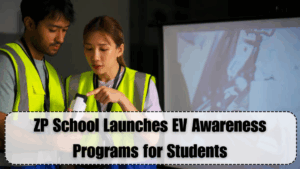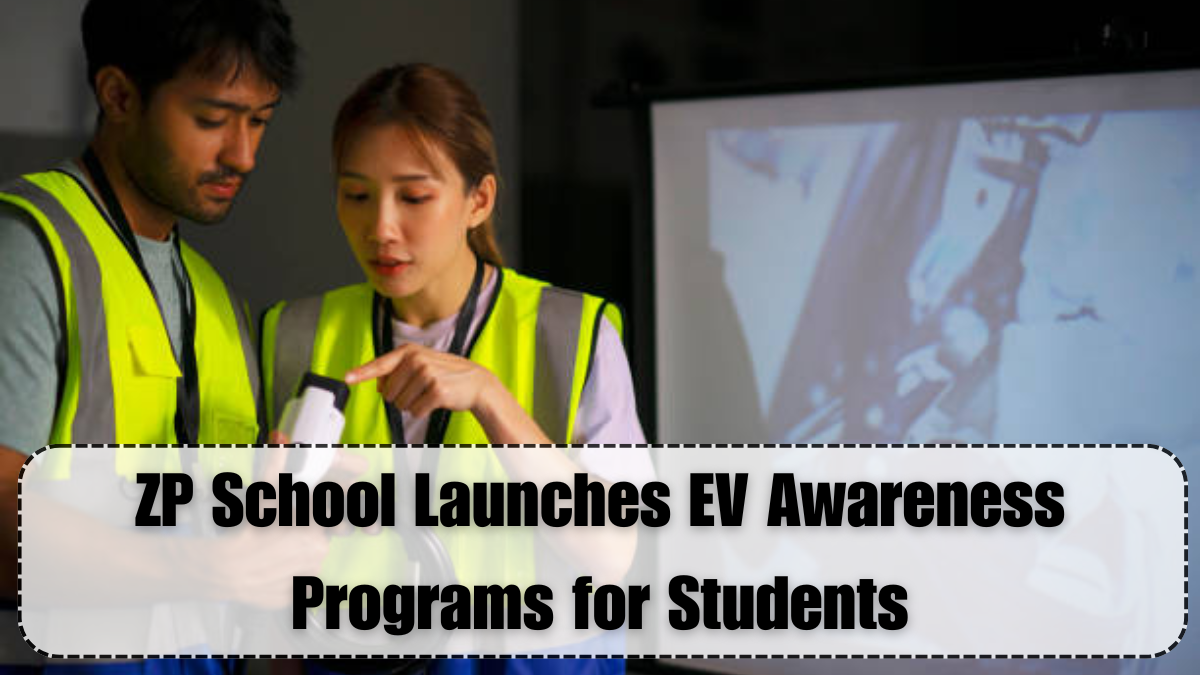EV learning programs have officially entered the rural education ecosystem as Zilla Parishad (ZP) School in SGP Taluka rolls out a comprehensive electric vehicle awareness curriculum for students. The initiative, aimed at instilling early knowledge about clean energy, sustainable transportation, and electric mobility, marks a major step forward in India’s green education movement—especially in underserved rural areas.
The program was launched by the school’s science faculty in collaboration with local EV volunteers and clean energy advocates. Designed for primary and middle school students, this EV education initiative covers fundamental concepts of electric vehicles, how they work, and their importance in reducing pollution and conserving energy.

Making EV Education Accessible in Rural Schools
The EV learning programs at ZP School are structured to suit the cognitive levels of young rural learners. Using animated visuals, interactive charts, and simple real-world comparisons, teachers explain how EVs differ from petrol vehicles, how batteries work, and why electric transportation matters for the future.
Classroom activities include:
-
Drawing EV diagrams
-
Identifying EV parts using toy models
-
Role-play on EV benefits vs. fuel-based pollution
-
Games focused on battery charging and usage
-
Discussions on “My Green Village” EV concepts
This grassroots-level EV education helps bridge the urban-rural gap in technological literacy and creates awareness at an early age.
Driving Community Awareness Through Students
What makes ZP School’s initiative stand out is its ripple effect in the community. As part of the program, students were encouraged to speak about EVs at home, helping parents and elders understand basic concepts of electric mobility and clean energy. Posters created by children now decorate walls in village squares, EV charging kiosks, and local shops.
This approach is not only educational but also transformative for communities that have had minimal exposure to EVs. It introduces EV learning programs as tools of social empowerment, enabling rural voices to be part of India’s larger clean energy conversation.
Clean Energy Lessons in a Practical Format
The teaching staff has also incorporated hands-on experiments and local field visits. Students are taken to nearby solar EV charging stations where they observe electric rickshaws and scooters being powered by clean energy. This reinforces textbook knowledge with real-world observation.
Each module in the EV education program includes:
-
A theory session using pictures and charts
-
A storytelling segment to simplify technical terms
-
A “spot the EV” walk where students identify electric vehicles in their area
-
Take-home worksheets for parents to read with their children
Such multi-layered engagement ensures long-term retention and a family-wide impact on EV awareness.
Rural Schools Pioneering Green Education
The ZP School’s commitment to EV learning programs positions it as a rural model school for clean energy education. Already, two neighboring village schools have reached out to replicate the framework. The district education officer has praised the school’s efforts and has proposed allocating budgets to scale up such rural school EV initiatives across the taluka.
By integrating sustainability into the everyday school curriculum, ZP School is cultivating eco-conscious citizens who will grow up with a sense of responsibility toward energy use and environmental care.
FAQs
What are EV learning programs at ZP School?
They are structured classroom and activity-based lessons that teach children about electric vehicles, battery use, and clean energy practices.
Why is EV education important in rural schools?
EV education helps bridge the information gap and promotes early awareness about green technology among children in underserved areas.
How are students learning about EVs?
Through activities like model-making, EV spotting walks, community posters, and field visits to solar-powered charging stations.
Are other rural schools implementing similar programs?
Yes, inspired by ZP School’s success, several rural schools are planning to launch similar EV learning programs in their regions.
Who supports the ZP School EV awareness program?
It is supported by the school staff, local EV volunteers, and clean energy advocates who offer resources and hands-on demonstrations.
Click here to know more.
